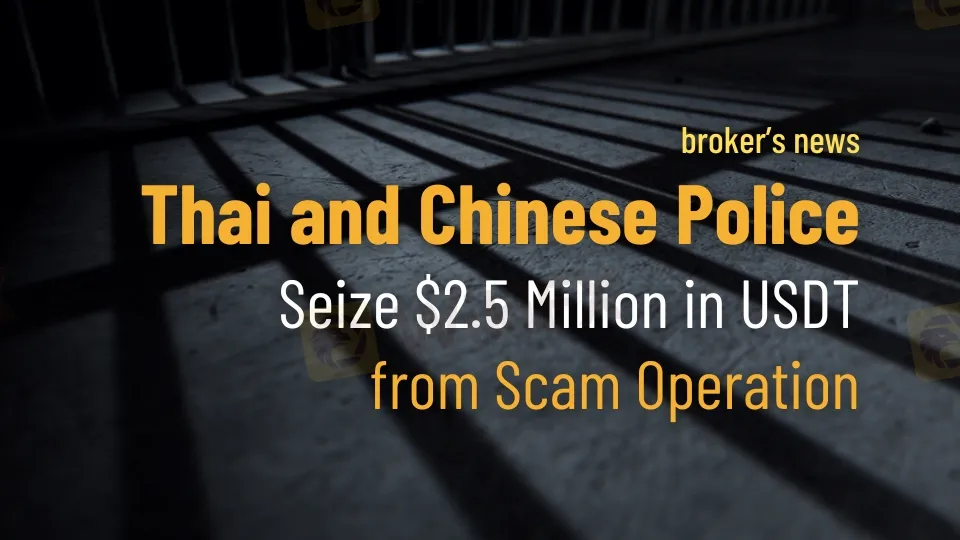简体中文
繁體中文
English
Pусский
日本語
ภาษาไทย
Tiếng Việt
Bahasa Indonesia
Español
हिन्दी
Filippiiniläinen
Français
Deutsch
Português
Türkçe
한국어
العربية
Thai and Chinese Police Seize $2.5 Million in USDT from Scam Operation
Abstract:Thai and Chinese authorities collaborate to arrest suspects and seize $2.5 million in USDT from a large-scale scam operation, highlighting the traceability of Tether transactions.

Thai and Chinese law enforcement authorities have detained two Chinese individuals and confiscated $2.5 million in Tether's USDT stablecoin, destroying a large-scale Ponzi enterprise. The arrests, which occurred on February 5, highlight the efficacy of international coordination in tackling cryptocurrency-related crimes.
The defendants, Ye Wanyou, 29, and Li Weijie, 30, were captured at a luxurious apartment in Bangkok. Upon arrest, they attempted to remove data from their phones but were quickly apprehended by officials. Initial investigations resulted in the seizure of assets totaling $44,550. Additional coordination with Chinese authorities resulted in the freezing of $2.5 million USDT kept in concealed digital wallets.
A spokeswoman for Tether remarked on the operation, saying, “With Tether, every action is online, every transaction is traceable, every asset can be seized, and every criminal can be caught.” This statement emphasizes the openness and traceability inherent in blockchain-based transactions, which can help law enforcement follow down unlawful acts.

The inquiry also turned up evidence that the suspects were involved in human trafficking activities along Thailand's border with Myanmar, notably in the Mae Sot region of Tak province. Authorities located prospective offices in Phnom Penh, Cambodia, and detected fraudulent goods sales activities in Thailand.
Police Lieutenant General Siam Boonsom, Commissioner of the Metropolitan Police Bureau, said that the two men had been charged with public fraud. Authorities oppose bail, and the investigation is ongoing, including efforts to find and capture any collaborators.
This investigation is part of a larger trend of international collaboration against cryptocurrency-related crimes. In mid-December 2024, the Nigerian Economic and Financial Crimes Commission detained approximately 800 people nationally in connection with crypto romance scams, with a large number of Chinese nationals implicated.
Furthermore, in February, Hong Kong police intercepted more than $3.37 million (HK$34 million) in scam earnings as part of an extensive investigation that targeted victims using artificial intelligence.
These cases highlight the growing necessity for international cooperation and cutting-edge technology solutions to combat the rising tide of cryptocurrency-related crimes. The traceability of blockchain transactions, as proved in the recent Thai-Chinese operation, is critical to these efforts, allowing authorities to monitor and collect illegal assets more efficiently.

Disclaimer:
The views in this article only represent the author's personal views, and do not constitute investment advice on this platform. This platform does not guarantee the accuracy, completeness and timeliness of the information in the article, and will not be liable for any loss caused by the use of or reliance on the information in the article.
Read more

Investing in Coinexx? Think Again Before Your Account Balance Hits ZERO
Coinexx has emerged as a nightmare for traders who once saw potential and profit in its platform. The problems lie in its lack of transparency, which has left many investors with a ZERO balance. Scamming investors by employing fraudulent tactics and introducing bogus trading rules is increasingly becoming its status symbol. The endless negative reviews of this scam broker are trending on various platforms. To expose the troubling investor experiences, we’ve compiled sharp complaints from verified users of Coinexx. Read on!

UnityFXLive: How This Broker Scammed Over $350,000 ? Know the Red Flags
On August 4, 2025 Indian police arrested two men for running a fake forex trading scam under the name UnityFXLive.com. The suspects were caught operating from a rented office in Goregaon, Mumbai. During questioning, they revealed the name of a third person who is believed to be the mastermind behind the scam. He is currently on the run. The scammers promised people high returns on forex investments, but instead of doing real trading, they stole the money using fake online platforms.

FXPRIMUS Exposed: Withdrawal Denials, Account Blocks & Other Alarming Issues
Have your fund withdrawal applications been constantly denied by FXPRIMUS? Does the forex broker inappropriately block your trading account? Are your deposits disappearing without reaching your trading account? There’s something seriously wrong with this forex broker, whose track record keeps getting worse by the day. Many traders have expressed their anguish on several broker review platforms. While reading those reviews, we could not resist exposing this broker. Check out how traders have criticized FXPRIMUS for its illicit acts.

FXPRIMUS Exposed: Withdrawal Denials, Account Blocks & Other Alarming Issues
Have your fund withdrawal applications been constantly denied by FXPRIMUS? Does the forex broker inappropriately block your trading account? Are your deposits disappearing without reaching your trading account? There’s something seriously wrong with this forex broker, whose track record keeps getting worse by the day. Many traders have expressed their anguish on several broker review platforms. While reading those reviews, we could not resist exposing this broker. Check out how traders have criticized FXPRIMUS for its illicit acts.
WikiFX Broker
Latest News
Forex Swaps Explained in 5 Minutes – Everything You Need to Know
Telegram vs WhatsApp vs Discord: Which Platform Is Best for Forex Signals?
Investment Scam Alert: FCA Identifies 15 Scam Brokers
BaFin Issues Consumer Alerts Against Unauthorised Platforms
Retired Man Loses Life Savings to ‘Sister Duo’ in Forex Scam
Exploring Laxmii Forex: Kharadi's Financial Hub
TradexMarkets: 5 Troubling Signs You Shouldn’t Ignore
A Guide to Buy Stop vs Buy Limit in Forex Trading
SEC Implements New Rules for Crypto-Asset Service Providers
Binance Users Convert Crypto and Withdraw Instantly to Mastercard
Currency Calculator


